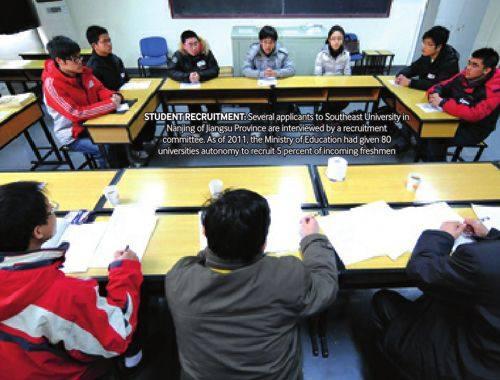Charting a Course
2013-04-29ByWanghairong
By Wang hairong

Recently, the Ministry of Education approved charters for six universities in a bid to deepen reform of the higher education system.
“Charters embody universities governing philosophies and system. They spell out the basic principles of university management and chart a direction for instruction,”said Sun Xiaobing, Director of the ministrys Department of Policies and Laws, on November 28. .
The six universities are Renmin University of China in Beijing, Southeast University in Nanjing of Jiangsu Province, Donghua University in Shanghai, Shanghai International Studies University, Wuhan University of Technology, and Central China Normal University in Wuhan, Hubei Province.
Within months, 25 more universities directly affiliated with the Ministry of Education will finish drafting their charters and submit them to the ministry for approval, while all universities are expected to finish making or amending their charters by the end of 2015, Sun said.
Charters will also help ensure the autonomy of institutions of higher learning, Sun said.
A decision to accelerate reform in public institutions such as universities and give more autonomy to them was made at the Third Plenary Session of the 18th Central Committee of the Communist Party of China held in November.
Sun said that the Ministry of Education will delegate more power to universities and release a plan to give universities more rights in administering their own affairs within a few months.
“A charter is a universitys constitution. Other rules, regulations or activities should not violate it,” said Wang Liming, a renowned legal expert and Vice President of Renmin university of China.
Charter highlights
The newly approved charters for the six universities have all highlighted universities rights to manage their own affairs, including the right to decide their own scale and department layout, and to make recruitment plans.
For instance, the charter for Renmin University of China stipulates that, “The university will make a recruitment plan according to social needs, school conditions and the education scale authorized by the government. The university has the right to adjust the ratio between students to be admitted into different departments.”
The charter of Shanghai International Studies University states that, “The university has the right to run itself according to law, free from illegal interference from any organization or individual.”

In recent decades, Chinese universities have been assigned administrative ranks and administered like government departments. The Ministry of Education has decision-making powers over many university affairs. For instance, it determines the total number of students that a university can recruit and has the power to appoint a universitys president and vice presidents.
The Higher Education Law implemented since 1999 identifies universities as legal entities serving society and specifies that universities have seven rights, including the rights to set up or cancel courses, choose textbooks and teaching methods, make teaching plans, and decide on the number of students to be recruited into each department. However, the total number of newly recruited students is set by the government.
From 1999 to 2005, the Ministry of Education published a series of policies giving more rights to schools, such as the right to adjust their own organizational structures. Nevertheless, administrative control over universities remains tight.
To liberate universities from administrative control, it is imperative that the relationship between universities and the government, between universities and society, and between the administrative and academic units within the universities be clearly defined, said Zhu Chongshi, President of Xiamen University.
“With charters in place, universities are supposed to have greater powers and authority over the administration of their own affairs, particularly with regards to academic administration,” wrote Xie Guangkuan in a published article. Xie is the director of the academic planning division in the office of planning and policy research at Peking University.
The approved charters have given a large role to university academic committees, which are defined as the highest decisionmaking organization in a universitys academic affairs.
For instance, the charter of Renmin University of China stipulates that an academic committee should consist of senior professors with no administrative positions; and the duty of the academic committee members is to put forward suggestions on important academic affairs.
Chinese universities are reportedly plagued with bureaucracy, where decisions tend to be made by university administrators. As a result, professors do not have much say in university affairs. For instance, the decision on whether to recruit a certain student is made by the recruitment office rather than professors. Giving academic committees more power is a measure to improve universities internal governance systems.
Another highlight of these university charters is that they all include provisions on protecting the rights and interests of teachers and students.
For instance, the charter of Renmin University of China states that students can participate in university management and put forward opinions, suggestions and criticisms on the universitys development and education reform.
Renmin University of Chinas charter has also specified the procedures for teachers and students to follow when filing an appeal. It states that the university faculty and staff have the right to express their disagreement with decisions related to their position, payment, fringe benefits, honors and awards, or disciplinary punishment against them and as well as the right to make an appeal concerning such issues.
Power struggles
China has more than 1,600 universities, yet so far, only a small number of these have their own charters, according to a report by The Beijing News.
As early as 1995, Chinas education law stipulated that universities have the right to administer themselves according to their charters; and in 2006, the Ministry of Education urged universities to produce their own charters.
In July 2010, China released a national educational plan for the next decade. China is going to build a modern university system with Chinese characteristics, says the document titled Outline of Chinas National Plan for the Medium- and Long-term Education Reform and Development (2010-20).
The document stipulates that universities should formulate charters according to law and administer themselves according to their charters.
In 2012, the Ministry of Education pro- mulgated an interim regulation on creating university charters, mandating that all public universities produce charters and spelling out requirements for the charters content. The ministry said that universities directly under its supervision should submit their charters to the ministry for approval, whereas local universities should submit theirs to local education authorities. Twenty-six universities were selected to pilot this initiative, including the six whose charters were recently approved.
However, many of those universities that have developed charters found the process to be arduous.
In January 2012, Hunan Provinces 11 local universities were asked to finish drafting their charters within a year, yet 10 out of the 11 failed to complete the task by the end of 2012, including Hunan Normal University.
Since a charter will reallocate power within a university, there are often obstructions when drafting one, Liu Xinshu, Director of the Legal Affairs Office of Hunan Normal University told The Beijing News.
Universities are also not sure about exactly how far they would be allowed to extend their autonomy.
Southeast University started to draft its charter in 2007. After 11 revisions, a draft was finalized in 2012.
Zhong Weijun, Director of the universitys Higher Education Research Institute, coordinated the work of the charter drafting group. Few domestic universities had charters that they could borrow from, so the group modeled its first draft after those of Western universities, Zhong said. Yet school leaders were not satisfied with the first draft, saying it was unrealistic, according to Zhong.
As to how much change the charters will make to universities, Qin Qianhong, a law professor at Wuhan University, said that charters could improve universities internal governance, yet may have little effect on the universitys external relations. In other words, the charters may not be followed in practice, Qin said.
Xu Qingshan, Qins colleague, saw it differently. He said that something is better than nothing; hence making charters is a small step toward building a modern university system in China.
